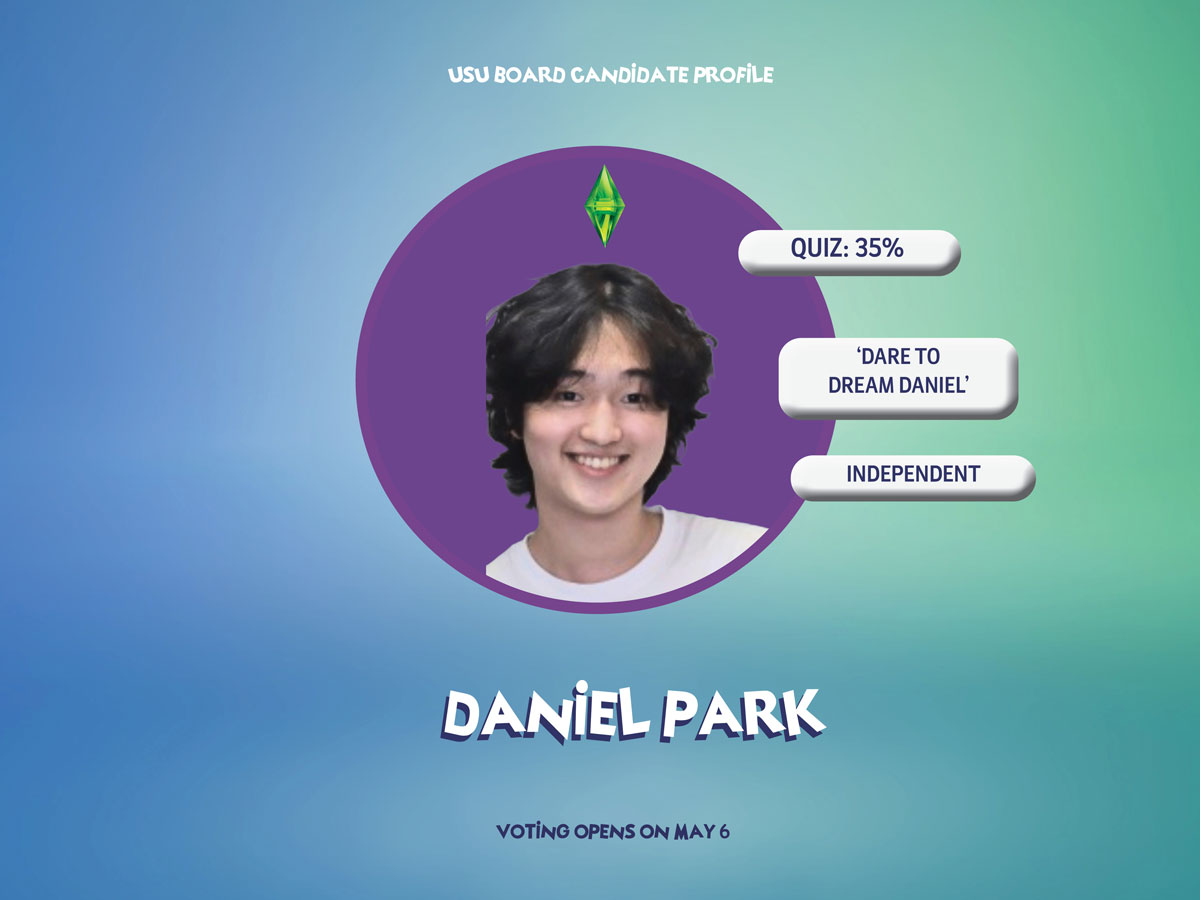Slogan: Dare to Dream Daniel
Colour: Purple
Faction: Independent
Degree: Com/Law IV
Quiz Score: 35%
Daniel Park is running as an independent candidate who centres his campaign on making USyd more fun and more inclusive. Drawing on his own experience as an expat, Park said he was motivated to run for the board because he has “always been surrounded by different cultures” and wants the university to be a vibrant space that reflects its diversity.
Park’s quiz results highlight a decent knowledge of the USU’s engagement with clubs and societies as well as the organization’s role on campus. He was able to correctly identify the data the USU holds on their members and the documents clubs needed to submit to the union.
Park’s knowledge of the university outside of the USU and the tertiary education sector as a whole was less impressive. He was unable to identify any recommendations of the University Accord Report, name any Deputy Vice Chancellors, or recall that degree placements are currently unpaid.
When asked what experience prepared him for the role, Park cited his long-term membership with the Korean Law Students Society where he has served as social media director as well as treasurer. He argued his experience running a society’s finances made him well-placed to serve on the board.
Despite that experience, Park was unable to identify many ways the USU could improve its engagement with clubs and societies. He said the USU had “mostly done things well,” and pointed to recent website improvements as an example.
The only specific suggestion Park made was perhaps hiring more staff members to increase the response time for inquiries made by clubs to the USU.
Park’s main idea to increase student engagement on campus targets international students. He argued that similar to the recent festival of creativity, the USU should collaborate with ethnocultural societies to create events that would spotlight different cultures by playing traditional games and offering movie screenings.
When asked what the USU could do to support international students beyond events, Park said the board should continue to advocate for an expansion of concession opal cards and, based on the work of SUPRA and the SRC, create workshops to teach students their rights as a tenant.
Park was inconsistent across the interview about whether the USU should play a stronger political role on campus. At points, he argued that the USU and SRC played very different roles and that the USU “shouldn’t be as active as the src, otherwise, the purpose of those organisations start to blur,” however, at other points his policy ideas would have the USU take on roles traditionally left to the SRC.
Park’s other flagship policy surrounds improving students’ mental health on campus. He highlighted that the pressures on students caused by coursework and financial responsibilities were often overwhelming. He advocated the creation of a USU counselling service based on student volunteers who would be trained to support students.
While well intentioned, Park was unable to fully articulate how these students would be adequately trained to take on counselling responsibilities and the implication that these students could have to handle severe mental health episodes outside traditional hours is problematic. Because these students would not be paid, Park relied on offering volunteers a certification to incentivize them to take part.
Overall, Park is a competent candidate who has a sound understanding of the USU and the needs of students, however, his policy platform lacks specificity. It remains unclear if he has the knowledge to effectively implement his flagship mental health and international engagement policies.





